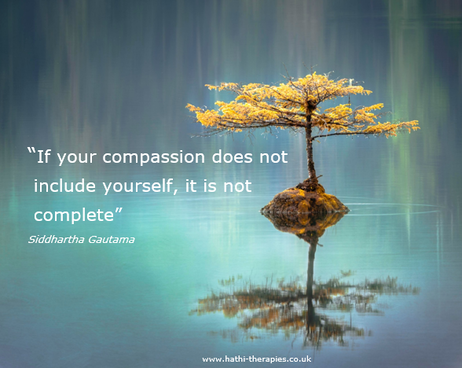|
So, recently I have been thinking about developing my own self-compassion…. After all I know I’m a work in progress! I believe we ALL are! Self-compassion is often spoken about as “being kind to yourself” but that isn’t the whole meaning of compassion. I don’t think compassion just happens; it’s a practice that can be developed and research is suggesting that compassion and mindfulness can actually make changes to the brain that helps improve our stress response. Compassion is about connecting with another human being on an equal footing and we also know that connection with others is a fundamental human need. I often encourage clients in learning self-compassion, but I realised (once again!) that I’m not always “taking my own medicine” outside of sessions. As a therapist I believe I can be intuitive and compassionate but I’m also human and that means not infallible. To be fair during my sessions I probably demonstrate more self-compassion than I always do outside of session!! (Not that I don't try - because I do but the reality is we all have to try harder sometimes! And old habits need a bit of work! We need to pay attention to ourselves)
I guess for a start, listening to yourself and being curious..... I do try to notice my own discomfort and check in on my inner dialogue but an incident a couple of days ago led me to re-evaluate my self-compassion! On this occasion, I really “heard” my self-talk…. the content seemed to develop a “rational” answer, but it wasn’t really resonating true and I suddenly realised it wasn’t what I was saying but how I was saying it. I wasn’t believing it, I wasn’t “feeling it” and the reason? It was all in the tone! Because my internal dialogue wasn’t that of an “equal” - my tone to myself was condescending and berating. It wasn’t how I would speak to someone else! Although my words “that’s not helpful right now….” were accurate, in acknowledging my tone (which made it sound more like a “well that’s not helpful is it?!.... tut-tut you shouldn’t think like that...” kind-of-tone) I was able to repeat it in a more compassionate and helpful way; acknowledging that I felt uncomfortable, that what I was experiencing was normal human stuff and I could do something different if I wanted. By forgiving myself for being human and not “telling myself off” I allowed myself to believe, to feel, that something else was possible.
The Cambridge dictionary defines compassion as a strong feeling of sympathy and sadness for other people’s suffering or bad luck and a desire to help”. It implies some kind of suffering together BUT with the aim of moving forward. So, compassion for others engages us in feeling both emotionally and physically another’s pain/suffering. However, compassion is not just about empathy; putting yourself in (what it might be like to be in) someone else's shoes, nor is it about personalising their pain or being kind at the expense of moving forward, (although kindness may be shown in compassion). So for instance, it’s not about just reassuring ourselves that everything is ok – because in fact everything ISN’T always ok! Sometimes what is needed is honesty and that can involve discomfort. Although compassion is not cruel and un-thinking, it can sometimes also take a confidence/courage to say what is needed, perhaps, especially to ourselves; but with compassion there IS a belief that there will be a way forward. Sometimes this might include saying something is not ok or saying “no” to something but it in a way that demonstrates an equality i.e. not pitying, berating or talking down but respecting the other as one human being to another (or to yourself as a human being) . sometimes we also need to notice and acknowledge our less helpful traits, acknowledge when something isn’t ok, learn to tolerate the discomfort; and with mindful awareness of our discomfort we might develop a way forward and allow ourselves to “let go” of mind blocking negative feelings such as guilt, shame and anger. Like the process of forgiveness in which no one is let off the hook; we are all accountable for our own thoughts and behaviour, but we don’t have to hold them unchanged and therefore hold negative feeling. There are some things that just aren’t ok but in reminding ourselves of healthy boundaries and accepting that we are not infallible we can keep trying to do something that is helpful.
5 Comments
also remember that its not always the most happy period of time for everyone and that even the pressure to be "joyful" is sometimes too much pressure. Follow over the next 25 days for my Top Tips for alleviating your stress levels heading toward Christmas Day.... Click through each number 1-25 for each day's "words of wisdom" - sorry no chocolate in this particular advent calendar! But to be sure, I shall also be found nibbling each of my advent treats as the 25th draws nigh!..... |
Categories
All
AUTHORCognitive Behaviour Therapist, Integrative Psychotherapist, Nurse Specialist (Mental Health), Mum, Youth Worker, Trainer....... Archives
December 2018
|
Proudly powered by Weebly






 RSS Feed
RSS Feed